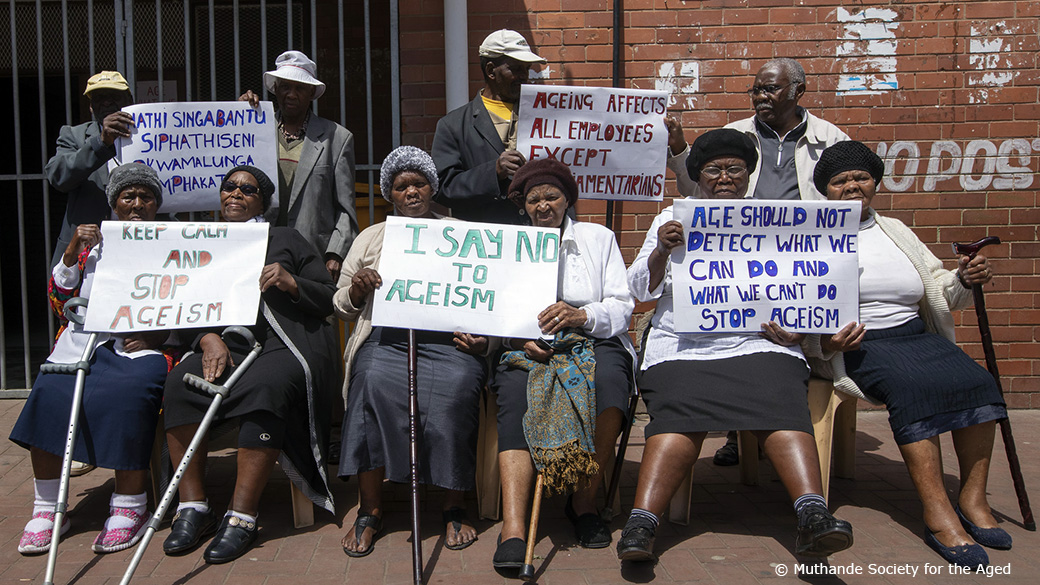After the first meeting of the UN Generation Equality Campaign in Mexico, HelpAge is appealing to leaders, civil society and feminist movements not to side-line older women if they want to achieve the desired progress towards gender equality.
This first meeting, held at the end of March, made positive calls for the inclusion of diverse voices and recognised the need to tackle multiple and intersecting forms of discrimination during discussions on economic justice and rights. But older women’s issues were not explicitly part of the conversation and this must be addressed before the follow-up meeting in Paris at the end of June.

The Mexico Forum could have done much more at a time when the COVID-19 pandemic has thrown into stark relief how older people are consistently left behind.
For gender equality to be achieved, all women and girls must access their economic rights. However, without explicit attention to older women, the UN Generation Equality Campaign risks women being unable to claim their rights when they reach older age.
This concerns women and girls of all ages, who rely on the invisible but significant economic contributions of older women, and who deserve to access social protection and decent work throughout their whole lives. For instance, the unpaid care that older women do supports the economic empowerment of younger generations, making older women’s work and wellbeing vital to the development of whole communities.
The draft blueprint on Economic Justice and Rights launched at the Mexico Forum could be so much stronger if it recognised the role played by older women.
The draft commits to making economic gender equality a reality for “women and girls, in all their diversity”, and implicitly includes older women. But if we really want to accelerate economic gender equality for women and girls, in all their diversity, the blueprint must explicitly mention categories of social difference, including age and disability.
It is important to recognise how these categories intersect with gender and how this affects older women’s ability to secure the income they need to flourish in older age, to live dignified lives and to have autonomy over their time. Inequalities associated with older age are not visible in the draft and this should be addressed in the next round.
The economic empowerment of women of all ages depends on transforming economic inequalities over the entire lifetime and addressing the accumulation of disadvantage. However, a coherent life course perspective is generally lacking in the priority actions and commitments.
Adding a life course perspective to the blueprint would support age-inclusion and enable women and girls in all their diversity to flourish from adolescence to older age, realising their rights and aspirations now and in the future.
The blueprint should also recognise the impact of ageism which adds a powerful additional source of inequality for women in older age. The accumulated and continuing effects of discrimination and the impact of ageism as a barrier to realising women’s economic equality and rights must be recognised.
Older women remain economically active, particularly in low- and middle-income countries, and continue to work, often in challenging conditions. Work is driven by economic necessity, but women also need to remain active, fulfilled and connected. Older women must be supported to do the work that matters to them.
The reality, however, is that after a lifetime of paid and unpaid work, many women enter older age without having accumulated the assets associated with productive work like property, savings, and entitlement to pensions. A lack of social protection compels them to continue working in precarious roles not only for their own survival but also to support others in their care.
What is more, data does not often capture the essential paid and unpaid work that older women do. It is one of main factors contributing to the absence of older women’s issues in policies and measures directly affecting their lives.
Data on the types of work women do must be used to inform economic and social public policy. It is crucial that data disaggregated by sex, age (in 10-year cohorts, up to and including older age groups) and disability, is collected, analysed, and used.
There were repeated calls during the Mexico Forum to include diverse voices in the Generation Equality process and in the blueprint’s implementation over the next five years.
The only way we can ensure diverse women’s voices are heard, their leadership becomes a reality, and their economic rights and autonomy are fully realised – as stated in the blueprint – is by the meaningful participation and representation of older women, especially the most marginalised.
The next Forum in Paris is fast approaching at the end of June. We want to use this as an opportunity to make sure that an age-inclusive perspective on Economic Justice and Rights is delivered.
It is short-sighted not to use this game-changing, civil society-centered, process to advance economic gender equality for women and girls of all ages. The draft blueprint on Economic Justice and Rights, along with the commitments made by governments, civil society organisations, philanthropists and the private sector – the early Commitment Makers – at the Forum in Mexico started the process. But there is much to be done if we want to make economic gender equality a reality for woman and girls in all their diversity, including in older age.
